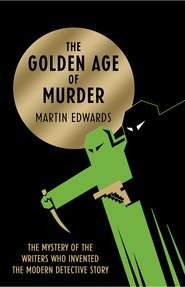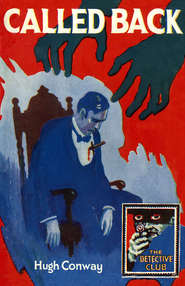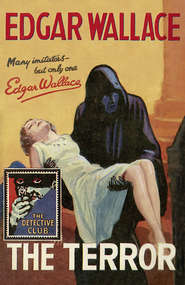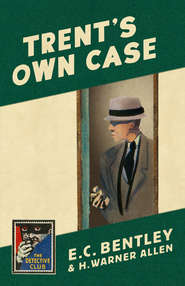По всем вопросам обращайтесь на: info@litportal.ru
(©) 2003-2024.
✖
A Voice Like Velvet
Автор
Год написания книги
2019
Настройки чтения
Размер шрифта
Высота строк
Поля
She was called Miss Wisdon, and her house was in Chepstow Walk, Notting Hill Gate. It was hard saying good-bye to Mrs Clarkson, and to thank her for all she had done.
‘You’ll be all right,’ she said. ‘And Miss Wisdon is quite decent. Don’t rub her up the wrong way.’
‘No,’ Ernest said.
‘And I expect her Mr Edwards will come and see you and see what he can do.’
‘Oh?’ he said, startled again.
‘Don’t rub him up the wrong way,’ she strongly advised him. ‘Then you’ll be all right.’
‘Yes. But who is he …?’
‘You’ll see in good time,’ she said. ‘Well, I’ll see you again soon. Be sure to write, or it will rub me up the wrong way.’
‘Yes, I will. Good-bye.’
‘Good-bye, dear,’ she said, and decided to kiss him, a little after the fashion of a mallet going conk up against a tub.
Conk!
Conk!
‘Well, good-bye, Master Ernest!’
‘Good-bye, Mrs Clarkson …!’
The parting seemed quite a sorrow, another rooting up. And although he did see her again soon, when the painting was finished, he had really said good-bye, for she died later that summer, and he was not again to live in the Hammersmith house.
He took a taxi to Miss Wisdon’s. He had been told she was ‘poorly’, or she would have come to collect him herself. He reached Miss Wisdon’s at six o’clock. He walked up the pathway of a tiny three-storied house. It was of the dimity variety, and in the garden were large stone toadstools. There was a note jutting out of the front door letter-box with his name on it explaining economically: ‘Pull string.’ He pulled and there was a long key on the other end, so he let himself in. In the little green glass hall was a second note propped up against a large brass pot with a fern in it. It was as economical as the first. ‘Upstairs.’ He felt Miss Wisdon was very rash with her trusting notes and he went upstairs feeling a little polite. On a door a third notice said: ‘Knock.’ He had reached the Robbers’ Cave. A thin voice said to come in.
Miss Wisdon was a little old-fashioned lady who belonged to the Victorian era, and who had no wish to modernize herself. She turned out to be good-hearted and easily scandalized. She was one of the world’s fussers, everything must be in its place before she could settle. The tea must be laid properly, with things in the right position, and if one of her stone toadstools fell over there was conversation to last the week. Tea must be exactly at four and the silver must be polished on Tuesday mornings between eleven and twelve. Maids who came in and ‘did’ for her rarely stopped long, they were ‘rude’, and they went out into the night (and sometimes the day) never to return. She liked being made a fuss of and was used to it, particularly from the mysterious Mr Edwards, a gentleman she regarded with considerable reverence and awe.
Scarcely anything was said about family matters, Miss Wisdon explaining, with familiar reasoning, that Ernest’s father had been ‘difficult but least said soonest mended’. It seemed she was a distant relation of Ernest’s mother and had always wanted to take an interest in him. She was shocked to discover he had no evident plans for a career, but she had already spoken to her old friend, Mr Edwards, who was an accountant, and so it seemed his future was in his hands! There were introductions which he was going to be so good as to give him, so that he could get started in a job. Miss Wisdon said of him: ‘He’s such a very busy man, but he has found time to dine with us on Tuesday.’ Then she said he was not able to come until Thursday. It seemed only fitting that Miss Wisdon should keep a cat. She hated dogs. ‘They water my doorstep.’ She said: ‘And Iris is afraid of them.’ Iris was her cat, a dreary thing, Ernest thought, though he tried to like her. She was a tabby. He never once saw her move from the kitchen chair while he was in the house, even for most pressing reasons, and could only assume she absorbed everything in some mysterious way. If he must have a cat, give him Mrs Clarkson’s black Tom, which fought like a virago, and feared neither man nor machine. Iris just sat, and the expression in her pink eyes was of an actress watching her understudy take over. When he gave her any fish she just turned her head away. But when Miss Wisdon did, she was good enough to allow herself to be fed piecemeal. Miss Wisdon bent over her, looking like a Victorian music-hall turn, turning to Ernest with pride in her eyes.
CHAPTER V (#ulink_eac4467f-cb83-5e8a-b951-f704861b3561)
ERNEST was really rather dazed at this period of his life. He was ‘resting’. He had a good think, but let life do the worrying for a change. And he met his first dangerous woman at Miss Wisdon’s house, or to be precise, over Miss Wisdon’s fence. She was a girl of sixteen called Violet. She was fond of chocolate, eating it with her mouth open the whole time, without spilling any of it, and without offering him any. She had raven black hair shaped like a worn-out mop, and a hefty-looking father who wandered about the narrow garden as if he was looking for something. Miss Wisdon didn’t ‘know’ them; they were sanitary inspectors who had come into a bit of money, or they would have been still in Battersea by the gasworks. Violet was fond of standing on the manure heap at the bottom of her garden with her legs wide apart. She balanced herself there in order to stare at him and whatever was going on at any of Miss Wisdon’s windows. The only thing which ever did go on at her windows was a dancing yellow duster, in the mornings. For the rest of the day there was just Ernest for Violet to look at. She thought he made a change. She asked him point blank to kiss her at their third meeting by the manure heap, chocolate and all. He thought it would be like kissing an éclair. ‘You’ve never kissed a girl,’ she challenged him, ‘have you?’
‘I may have done,’ he told her, embarrassed.
‘Where?’
‘I can’t remember.’
‘When, then?’
‘I can’t remember now.’
‘I knew you’d never! You went red as red!’
‘No, I didn’t! In any case, why should I tell you?’ he said, stung, but curious about her and this odd phase of his unsatisfactory life.
‘I didn’t want to know,’ she said, womanlike.
Then she said:
‘All the boys are after me. I go to the pictures twice a week.’
‘Oh?’ he said.
‘Joo go to the pictures?’
‘Now and then.’
‘I like Charlie Ruggles,’ she said in a certain way. ‘He’s up the road this week.’
‘I’ve seen it,’ he said, deciding quickly.
‘What’s it about, then?’
‘Well, if I tell you,’ he said glibly, ‘it’ll spoil it for you.’
Her long red tongue travelled down a yard of chocolate.
‘You haven’t seen it. And you’ve never bin with a girl. And you’re a dirty little liar.’
She ran up the garden and then ran back to say:
‘You can call me Violet. But I shall call you Squit.’
Then she ran away again.
It was Squit Bisham, watching her!
On Thursday afternoon when Mr Edwards was expected to dinner, Violet came to her manure heap when Bisham was thoughtfully weeding Miss Wisdon’s aster bed.
‘Hullo, Squit,’ she said.
‘Hallo,’ he said, generously.
‘Dad and Mum have gone out to supper. Take me to the pictures and we’ll be back by nine o’clock. We’ll have a good time.’
She looked flushed and pretty in a rough way. She was still licking chocolate. He was rather interested in the feminine figure at this time. But was it wise to take up with her? He thought of women in terms of marriage, and there was something a little unromantic about marrying a Sanitary Inspector’s daughter. He was very snobbish at this time. Violet was in a very chatty mood, called him Squit in quite a friendly way, and it obviously didn’t occur to her that he could refuse. She told him all about her grandma, who had the dropsy, giving interesting details. Finally she said he was to slip out into the street in exactly an hour’s time.
‘See? Have you got any money?’
‘Well, yes. But …’










